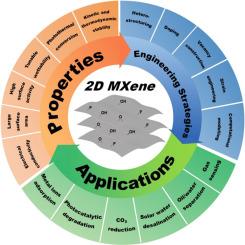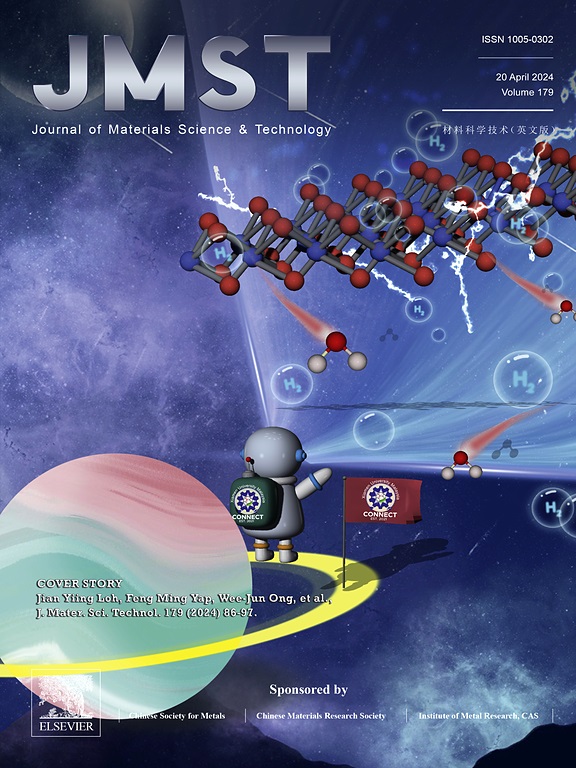Engineering of 2D MXene-derived nanocomposites for environment-related interdisciplinary applications
IF 11.2
1区 材料科学
Q1 MATERIALS SCIENCE, MULTIDISCIPLINARY
引用次数: 0
Abstract
There is a booming scientific research community looking into two-dimensional (2D) MXenes with superior physical and chemical characteristics that are potentially applicable in many fields. However, compared to energy conversion and storage, their applications in environment remediation have received much less attention. Hence, this review summarizes the recent progress of 2D MXenes and their derivates adopted for interdisciplinary applications with a focus on environment-related areas, aiming at promoting the diversity of MXenes and providing a refreshing background. Firstly, the properties including excellent electrical conductivity (as high as 15,100 S cm−1), large surface area (100–1,000 m2 g−1), tunable surface chemistry (-O, -OH or -F terminal groups), photothermal conversion (∼100 % light-to-heat efficiency) as well as kinetic and thermodynamic stability of 2D MXenes are briefly introduced. The engineering strategies of MXene-derived nanocomposites through the construction of heterostructures, metal/non-metal doping, the introduction of vacancies, strain engineering, and computation modelling are then followed. Finally, we emphasize current advances achieved in versatile applications including metal ions adsorption, photocatalytic organics degradation and CO2 reduction, solar water desalination, oil/water separation, and gas sensing, where engineering, mechanisms, and performances of different 2D MXene derivates are discussed. It is envisioned that 2D MXenes will become one of the prominent nanomaterials effective for diverse applications in the years to come.

用于环境相关跨学科应用的二维 MXene 衍生纳米复合材料工程学
二维(2D)MXenes 具有优越的物理和化学特性,可应用于许多领域,因此科研界对二维(2D)MXenes 的研究正在蓬勃发展。然而,与能量转换和储存相比,它们在环境修复方面的应用受到的关注要少得多。因此,本综述总结了二维 MXenes 及其衍生物在跨学科应用方面的最新进展,重点关注环境相关领域,旨在促进 MXenes 的多样性,并提供一个令人耳目一新的背景。首先,简要介绍了二维 MXenes 的优良导电性(高达 15,100 S cm-1)、大表面积(100-1,000 m2 g-1)、可调表面化学性质(-O、-OH 或 -F 端基)、光热转换(光热转换效率∼100%)以及动力学和热力学稳定性等特性。随后,我们还介绍了通过构建异质结构、掺杂金属/非金属、引入空位、应变工程和计算建模等方法实现二维二茂钛纳米复合材料的工程策略。最后,我们强调了目前在金属离子吸附、光催化有机物降解和二氧化碳还原、太阳能海水淡化、油/水分离和气体传感等多功能应用领域取得的进展,并讨论了不同二维 MXene 衍生物的工程、机理和性能。展望未来,二维二氧杂环烯将成为有效应用于多种领域的重要纳米材料之一。
本文章由计算机程序翻译,如有差异,请以英文原文为准。
求助全文
约1分钟内获得全文
求助全文
来源期刊

Journal of Materials Science & Technology
工程技术-材料科学:综合
CiteScore
20.00
自引率
11.00%
发文量
995
审稿时长
13 days
期刊介绍:
Journal of Materials Science & Technology strives to promote global collaboration in the field of materials science and technology. It primarily publishes original research papers, invited review articles, letters, research notes, and summaries of scientific achievements. The journal covers a wide range of materials science and technology topics, including metallic materials, inorganic nonmetallic materials, and composite materials.
 求助内容:
求助内容: 应助结果提醒方式:
应助结果提醒方式:


